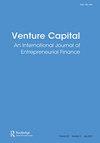众筹中的债务-股权选择:两种方法
IF 2.3
4区 管理学
Q2 BUSINESS, FINANCE
引用次数: 2
摘要
基于证券的众筹已经发展成为中小企业(SME)的重要融资来源,但人们对众筹活动如何适应中小企业的资本结构决策知之甚少。将中小企业资本结构与众筹文献的见解结合起来会产生高度的模糊性,因为众筹似乎改变了中小企业的融资动态,但方向不确定。我们基于先前关于中小企业资本结构的文献构建变量,以实证检验哪些特征有助于解释使用众筹的企业寻求股权融资或债务融资的选择。我们使用了在美国证券交易委员会众筹监管下注册的713个股权和403个债务活动公告。我们的经验程序包括传统的逻辑回归方法和随机森林分类器。我们发现,较不成熟、融资需求较小的公司更有可能发行股票,而增长势头强劲、融资需求较大的公司更倾向于发行债券。本文章由计算机程序翻译,如有差异,请以英文原文为准。
The debt-equity choice in crowdfunding: a two-method approach
ABSTRACT Securities-based crowdfunding has evolved into an important source of financing for small and medium-sized enterprises (SME), but little is known about how crowdfunding campaigns fit into the capital structure decisions of SMEs. Combining insights from SME capital structure and crowdfunding literatures results in high ambiguity, as crowdfunding seems to change SME financing dynamics, but in an uncertain direction. We construct variables based on previous work on SME capital structure literature to empirically test which characteristics help explain the choice to seek either equity or debt funding among firms using crowdfunding. We use 713 equity and 403 debt campaign announcements registered with the U.S. Securities and Exchange Commission under Regulation Crowdfunding. Our empirical procedure includes both the traditionally used logistic regression method as well as a random forest classifier. We find that less-established firms with smaller funding needs are more likely to issue equity, whereas firms with strong growth momentum and larger funding needs prefer debt.
求助全文
通过发布文献求助,成功后即可免费获取论文全文。
去求助
来源期刊

Venture Capital
BUSINESS, FINANCE-
CiteScore
4.10
自引率
16.70%
发文量
21
期刊介绍:
Venture Capital publishes cutting edge research-based papers from academics and practitioners on all aspects of private equity finance such as: •institutional venture capital •informal venture capital •corporate venture capital •public sector venture capital •community venture capital It also covers all aspects of the venture capital process from investment decision to exit, including studies on: •investment patterns •investment decision-making •investment performance •realisation of investment value exit routes (including the relationship with junior capital markets such as NASDAQ, EASDAQ, AIM and Nouvelle March). •economic impact and public policy
 求助内容:
求助内容: 应助结果提醒方式:
应助结果提醒方式:


